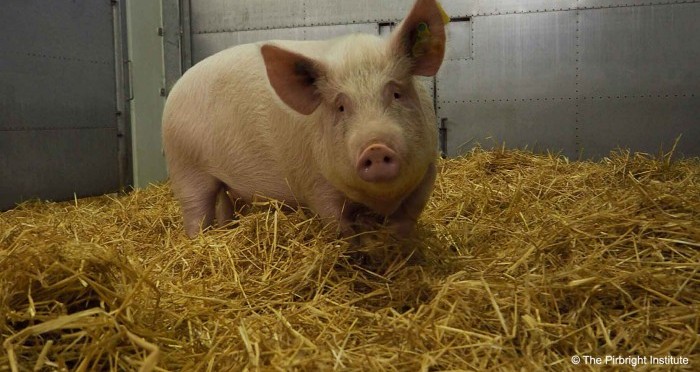Scientists from the Pirbright Institute say they are ‘huge step’ closer to developing a vaccine for African swine fever (ASF), after 100% of pigs immunised in a study were protected from a lethal dose of ASF virus (ASFV).
The team at the Surrey research institute created what is known as a vectored vaccine by inserting eight strategically selected ASFV genes into a non-harmful virus, known as a vector. Vectors are used to deliver the genes to pig cells where they produce viral proteins that prime the pig immune system to rapidly respond to an ASF infection.
Their study, published in Vaccines, showed the combination of eight virus genes protected pigs from severe disease after challenge with an otherwise fatal strain of ASFV, although clinical signs of disease did develop.
This is the first time that a vectored vaccine has shown a protective effect against ASF.
The researchers stressed that further development is needed, while the vaccine will need to go through a lengthy approval process.
But if it is successful, the vaccine would enable the differentiation of infected animals from those that have received a vaccine (DIVA), which would allow vaccination programmes to be established without sacrificing the ability to trade, they said.
Dr Chris Netherton, head of Pirbright’s ASF Vaccinology Group, said: “Demonstrating that our vaccine has the potential to fully protect pigs against ASF is a huge step in our vaccine development programme.
“We have already begun work to refine the genes included in the vaccine to improve its effectiveness and provide more protection.”
Christine Middlemiss, the UK’s Chief Veterinary Officer, described the findings as ‘a very encouraging breakthrough, which means we are one step closer to safeguarding the health of our pigs and the wider industry’s role in global food supply from ASF’.
“While there has never been an outbreak of African swine fever in the UK, we are not complacent and already have robust measures in place to protect against animal disease outbreaks,” she said.
“We will also continue to work closely with the UK pig sector to raise awareness of the risks and advise on maintaining high biosecurity standards.”
ASF continues to spread in Eastern Europe and Asia, recently confirmed in India for the first time, while cases have also been reported recently in Africa and Papua New Guinea. It has resulted in the deaths of million pigs and disrupted global trade systems.
Despite ongoing research into a possible vaccine in various parts of the world, the, the absence of a commercial vaccine has hampered efforts to control the virus.
This research was funded by the Defra and the Biotechnology and Biological Sciences Research Council (BBSRC), part of UK Research and Innovation (UKRI).




